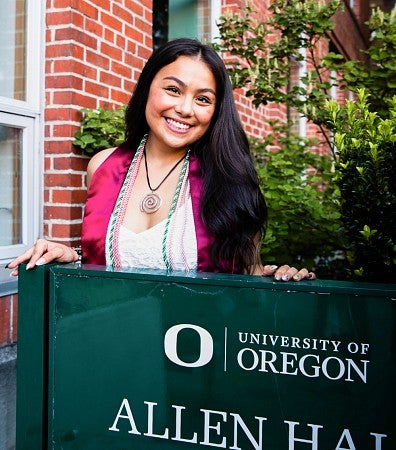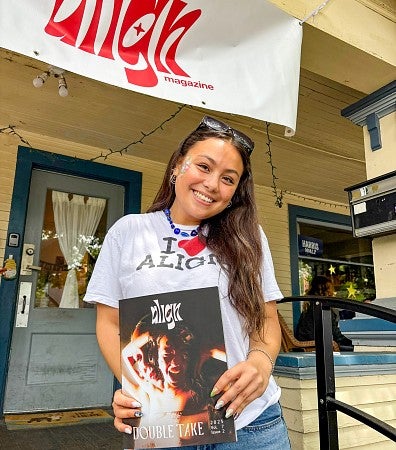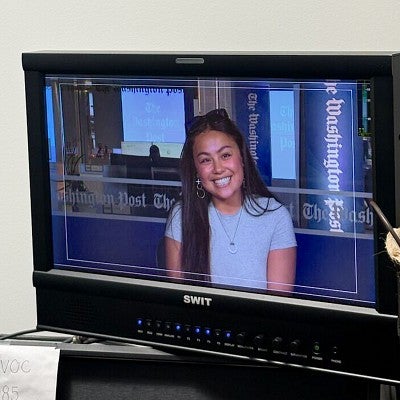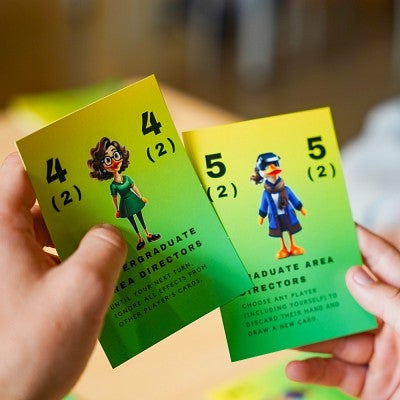Seymour is double majoring in journalism and media studies because she loves media, games and ethical storytelling.
By Lily Reese, class of ’27
Journalism major Lily Reese interviewed journalism and media studies major Sydney Seymour about her progression into trauma-informed reporting. This article is part of a series highlighting graduating seniors from the SOJC. It has been edited for length.

1. What initially drew you to study both journalism and media studies, and how has minoring in ethics shaped your approach to reporting?
I learned about my love for telling people’s stories in the way they wanted to tell them when I was in high school through writing for my school yearbook. I eventually became Editor-in-Chief, got to explore the behind-the-scenes of a publication, and knew I wanted to pursue journalism.
But I struggled with major impostor syndrome during my freshman year of college. In my Reporting I class, I kept thinking, ‘I don’t know if I’m cut out for this,’ especially since I was struggling with social anxiety, and I’m naturally introverted.
But Mark Blaine, my Reporting I professor, said something during class that helped me as a journalist. He said he treats his interview questions like armor — his shield and helmet to get him into the mindset of talking to strangers.
During that period of uncertainty, I considered switching to media studies because I was so anxious about pursuing journalism. I just loved media; I loved consuming TV shows, movies, video games, podcasts, music — any media, really, so why not study it?
And pretty early in my media studies degree, I took Media Ethics with Whitney Phillips, and that was the class that solidified why I was studying media, and that I should study ethics. With its focus on true crime, that class really taught me about trauma and the importance of paying attention to trauma. Trauma is now constantly something I’m thinking about in my journalism.
The class focused on the ethics of true crime and specifically explored the dangers of sensationalism, the importance of framing and the role trauma plays in media consumption. I learned how the media can be a destructive force that elicits harmful, ill-informed reactions. As a journalist, it was pivotal for me to learn about how my stories could harm my audience and even evoke trauma in myself. This is one of the classes that inspired my current approach to covering stories as a journalist in a trauma-informed, ethical way to ensure that I try my best to do no harm. Now, my career goal is to become a trauma-informed journalist, and this class helped solidify that and marry two of my passions: mental health and journalism.

2. Has there been a professor who has challenged you in unexpected ways and helped you grow as a reporter?
Journalism-wise, Professor of Practice Damian Radcliffe has given me not only the motivation but the confidence that I can go into the real world. He’s an inspiring individual, and has had a profound impact on building my own professional experience and providing opportunities for students, including visiting 16 different media publications in New York. He always reminds — not only me, but all students — not to sell ourselves short.
He also gave me advice for the interview for the Charles Snowden Program for Excellence in Journalism and encouraged me to go through with the internship application. He was a great motivator, and so I'm very grateful to him.
3. Can you tell me about a specific experience or class that shaped your interest in international reporting or press freedom?
I took the trip to D.C. for the hostage project class, which is a class on hostage diplomacy led by Professor of Practice David Ewald and the Washington Post’s Jason Rezaian. It was really influential for me and taught me a lot about trauma-informed reporting. During the class, I talked to former hostages and their loved ones and Kate Woodsome, a trauma-democracy scholar and a Pulitzer Prize-winning former Washington Post journalist.
After learning about hostage diplomacy, wrongful detainment and press freedom, it ignited my desire to go to Belgium for World Press Freedom Day.
I think it’s really important to fight for and protect press freedom and the safety of journalists, and it’s a topic I hope to continue to explore in my work. As a journalist myself and someone who is hoping to be an international reporter in the future, listening to those at the heart of hostage diplomacy and amplifying the voices of threatened journalists is a small way I can contribute to fostering press freedoms around the world.

4. You were awarded a Charles Snowden Program for Excellence in Journalism internship and will be reporting in Ashland. What are you excited and nervous about?
I'm really excited to focus more on community-centered journalism, working closely with communities and meeting people where they are to ensure the content I produce serves affected communities. I’ve also been wanting to take more of a community-centered approach in a rural place and practice rural journalism, because I haven’t done that before.
The Snowden program also has a big emphasis on journalism ethics, which is one of the reasons I applied to the program. I’m looking forward to applying my Ethics minor and what I’ve learned about ethical journalism practices to that internship and, hopefully, applying trauma-informed approaches as well with coverage on wildfires and houselessness.
I’m honored and grateful for this incredible opportunity. I have to thank Brent Walth, who is an amazing professor and the reason why I heard about the internship. He’s the coordinator of the program, and he's been a great resource. So I'm very thankful for him, and my editor Bert Etling in Ashland.
It is going to be a small newsroom, especially compared to Align magazine, UO’s largest media organization — which I’m the editor of now — so that'll be different. I’m a little nervous about the change, but I honestly think I will appreciate a more intimate and close environment.

5. What advice would you give to SOJC students who want to pursue investigative reporting or magazine leadership?
Get involved with any club, organization or media publication that you’re interested in. Get involved with it as soon as you can. And if it doesn’t work for you, try the next one. I will be forever grateful that I joined Align. It’s been the most consistent and one of the most impactful things in my college career. Any student who wants to produce media should join a publication and start producing that media as soon as they can. You will find like-minded individuals with whom you will get along and people you can connect with for future opportunities.
Besides that, I highly recommend the game studies program. I've taken a few game studies classes, and I was going to pursue a game studies minor, but unfortunately, I didn’t have enough time in my schedule. But game studies is something that I’m interested in.
My work in those classes has produced some of my favorite projects at the SOJC. I made a card game based on the SOJC, where I used AI to create duck characters out of professors, faculty and staff at the SOJC, and that was really fun. And I also produced a news game on press freedom, where you’re a journalist experiencing the threats and dangers of practicing journalism in a country that does not support journalism. I’d like to thank Associate Professor Maxwell Foxman for teaching me the necessary skills for those projects and doing such a great job spearheading the game studies minor.
These courses have been influential in giving me a niche and letting me explore my interest in video games and my desire to use games and gamification in my journalism.
Lily Reese is a second-year journalism major at the SOJC with a minor in food studies. She is passionate about storytelling, sustainability and lifelong learning. Lily loves to write, and her work can be found in Ethos magazine and Align magazine.
